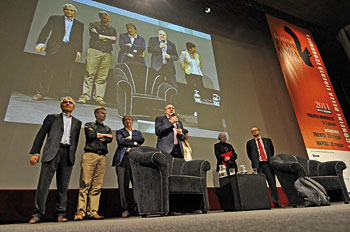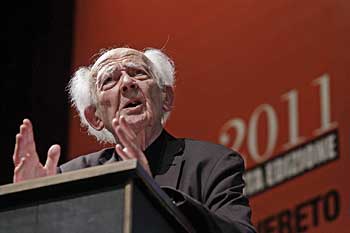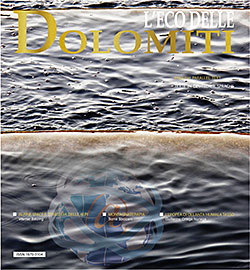ZYGMUNT BAUMAN ON THE
COMMERCIALISATION OF MORALITY
Mariapia Ciaghi

The last event at the Trento Festival of Economics featured the great Polish Zygmunt Bauman, theoretician of "liquid modernity". Bauman analysed the market and consumerism and how they fuel through the commercialisation of morality today. We are induced into suppressing our sense of guilt towards the others and those we love, neglecting them in order to satisfy the imperatives of production, through consumption and shopping.  In Bauman's words - "We carry a terrible burden on our shoulders, including moral obligations, our natural impulses to care for others, and we try to ease our conscience through moral tranquillizers offered by shops and supermarkets". In Bauman's view the answer primarily lies in the awareness that the resources are not infinite, that we cannot ease the pain of living simply by continuing to increase production and consumption. In his presentation, Bauman firstly complimented the organizers for choosing the topic of this festival "The borders of economic freedom", a topic which he described as "fundamental, because today we are beginning to understand that the range of choices open to us is actually decreasing, rather than increasing and expanding". In Bauman's words - "We carry a terrible burden on our shoulders, including moral obligations, our natural impulses to care for others, and we try to ease our conscience through moral tranquillizers offered by shops and supermarkets". In Bauman's view the answer primarily lies in the awareness that the resources are not infinite, that we cannot ease the pain of living simply by continuing to increase production and consumption. In his presentation, Bauman firstly complimented the organizers for choosing the topic of this festival "The borders of economic freedom", a topic which he described as "fundamental, because today we are beginning to understand that the range of choices open to us is actually decreasing, rather than increasing and expanding".
 The increasing inequality on a global level is going in the opposite direction with respect to the ideas of the pioneers of freedom and illuminism, such as Descartes, Bacon and Hegel. The richest country in the world today – Qatar - has a standard of living 428 times higher than Zimbabwe, the poorest country. The richest 20% of humanity controls 75% of wealth, the poorest 20% has just 2%. Up to 30-40 years ago the trend was different, the gap between the countries seemed destined to disappear. How did this happen? There are two crucial factors, and they are more cultural and social than economic. The first is that we want to enjoy a rich, wealthy lifestyle, which has led us to adopt purchase, shopping as our main indicator. It would appear that all roads to happiness lead to shops. This subjects the economic system, and more generally our entire planet, to enormous pressure, which is disastrous for the new generations, and it is evident that we are living beyond our means, on our children's shoulders. Then, there is the conflict resolution issue. In the course of modern times we have developed capabilities to resolve social conflicts, even those related to the unequal distribution of goods, by increasing production, GDP. When GDP drops, food supplies are not at risk, yet panic still develops, as conflict management is based on the increase of production and consumption. The increasing inequality on a global level is going in the opposite direction with respect to the ideas of the pioneers of freedom and illuminism, such as Descartes, Bacon and Hegel. The richest country in the world today – Qatar - has a standard of living 428 times higher than Zimbabwe, the poorest country. The richest 20% of humanity controls 75% of wealth, the poorest 20% has just 2%. Up to 30-40 years ago the trend was different, the gap between the countries seemed destined to disappear. How did this happen? There are two crucial factors, and they are more cultural and social than economic. The first is that we want to enjoy a rich, wealthy lifestyle, which has led us to adopt purchase, shopping as our main indicator. It would appear that all roads to happiness lead to shops. This subjects the economic system, and more generally our entire planet, to enormous pressure, which is disastrous for the new generations, and it is evident that we are living beyond our means, on our children's shoulders. Then, there is the conflict resolution issue. In the course of modern times we have developed capabilities to resolve social conflicts, even those related to the unequal distribution of goods, by increasing production, GDP. When GDP drops, food supplies are not at risk, yet panic still develops, as conflict management is based on the increase of production and consumption.
 Can we find an alternative to production and consumption growth in order to find satisfaction, ultimately, to be happy? It is necessary if we wish to avoid destroying our habitat and generating catastrophic phenomena such as wars. Current consumption levels are already unsustainable from an environmental and economic point of view, as explained by Tim Jackson in his important book published two years ago. The concept of prosperity outside the infinite consumption trap is considered somewhat mad or revolutionary. Jackson believes there are alternatives: relationships, families, districts and communities, the meaning of life. There are enormous resources in terms of human happiness which are not exploited. Can we find an alternative to production and consumption growth in order to find satisfaction, ultimately, to be happy? It is necessary if we wish to avoid destroying our habitat and generating catastrophic phenomena such as wars. Current consumption levels are already unsustainable from an environmental and economic point of view, as explained by Tim Jackson in his important book published two years ago. The concept of prosperity outside the infinite consumption trap is considered somewhat mad or revolutionary. Jackson believes there are alternatives: relationships, families, districts and communities, the meaning of life. There are enormous resources in terms of human happiness which are not exploited.
The majority of the policies created by the governments around the world is going precisely in the opposite direction. These policies rarely go beyond the next election deadline, and seldom consider what will happen in 20 or 30 years. We are assisting in a process of trading and commercialization of morality. The markets are used to directing human needs, needs that were not satisfied by the market in the past. This is what I mean with my "commercialization of morality" concept.
 The great economists of the past affirmed that needs are stable and once those needs are satisfied we can stop and enjoy the work done. There was a conviction that at the end of the process beginning with the start of modernization we would arrive at a stable economy in perfect equilibrium. Subsequently a different route was taken, with the invention of the customer. It was understood that goods have a value not only in terms of their use, but also a symbolic value as status symbols. The product was no longer purchased because it was needed, but because it was desired. Thus the objective became the constant development of new desires in human beings. However, at a certain point even desires meet with limitations. Thus the limit was overcome by commercialising morality: there are no limits to love or to the affection we wish to demonstrate to others. Unconditional responsibility, accompanied by uncertainty and anxiety: this is the driving force of consumerism today and the impulse which pushes us to do ever more and to produce more and more. But this is not possible, because resources are always limited. Perhaps the moment of truth is near, but we can do something to slow it down: by embarking on an authentically human path made of mutual understanding". The great economists of the past affirmed that needs are stable and once those needs are satisfied we can stop and enjoy the work done. There was a conviction that at the end of the process beginning with the start of modernization we would arrive at a stable economy in perfect equilibrium. Subsequently a different route was taken, with the invention of the customer. It was understood that goods have a value not only in terms of their use, but also a symbolic value as status symbols. The product was no longer purchased because it was needed, but because it was desired. Thus the objective became the constant development of new desires in human beings. However, at a certain point even desires meet with limitations. Thus the limit was overcome by commercialising morality: there are no limits to love or to the affection we wish to demonstrate to others. Unconditional responsibility, accompanied by uncertainty and anxiety: this is the driving force of consumerism today and the impulse which pushes us to do ever more and to produce more and more. But this is not possible, because resources are always limited. Perhaps the moment of truth is near, but we can do something to slow it down: by embarking on an authentically human path made of mutual understanding". |
 NUMBER 11
NUMBER 11


 In Bauman's words - "We carry a terrible burden on our shoulders, including moral obligations, our natural impulses to care for others, and we try to ease our conscience through moral tranquillizers offered by shops and supermarkets". In Bauman's view the answer primarily lies in the awareness that the resources are not infinite, that we cannot ease the pain of living simply by continuing to increase production and consumption. In his presentation, Bauman firstly complimented the organizers for choosing the topic of this festival "The borders of economic freedom", a topic which he described as "fundamental, because today we are beginning to understand that the range of choices open to us is actually decreasing, rather than increasing and expanding".
In Bauman's words - "We carry a terrible burden on our shoulders, including moral obligations, our natural impulses to care for others, and we try to ease our conscience through moral tranquillizers offered by shops and supermarkets". In Bauman's view the answer primarily lies in the awareness that the resources are not infinite, that we cannot ease the pain of living simply by continuing to increase production and consumption. In his presentation, Bauman firstly complimented the organizers for choosing the topic of this festival "The borders of economic freedom", a topic which he described as "fundamental, because today we are beginning to understand that the range of choices open to us is actually decreasing, rather than increasing and expanding". The increasing inequality on a global level is going in the opposite direction with respect to the ideas of the pioneers of freedom and illuminism, such as Descartes, Bacon and Hegel. The richest country in the world today – Qatar - has a standard of living 428 times higher than Zimbabwe, the poorest country. The richest 20% of humanity controls 75% of wealth, the poorest 20% has just 2%. Up to 30-40 years ago the trend was different, the gap between the countries seemed destined to disappear. How did this happen? There are two crucial factors, and they are more cultural and social than economic. The first is that we want to enjoy a rich, wealthy lifestyle, which has led us to adopt purchase, shopping as our main indicator. It would appear that all roads to happiness lead to shops. This subjects the economic system, and more generally our entire planet, to enormous pressure, which is disastrous for the new generations, and it is evident that we are living beyond our means, on our children's shoulders. Then, there is the conflict resolution issue. In the course of modern times we have developed capabilities to resolve social conflicts, even those related to the unequal distribution of goods, by increasing production, GDP. When GDP drops, food supplies are not at risk, yet panic still develops, as conflict management is based on the increase of production and consumption.
The increasing inequality on a global level is going in the opposite direction with respect to the ideas of the pioneers of freedom and illuminism, such as Descartes, Bacon and Hegel. The richest country in the world today – Qatar - has a standard of living 428 times higher than Zimbabwe, the poorest country. The richest 20% of humanity controls 75% of wealth, the poorest 20% has just 2%. Up to 30-40 years ago the trend was different, the gap between the countries seemed destined to disappear. How did this happen? There are two crucial factors, and they are more cultural and social than economic. The first is that we want to enjoy a rich, wealthy lifestyle, which has led us to adopt purchase, shopping as our main indicator. It would appear that all roads to happiness lead to shops. This subjects the economic system, and more generally our entire planet, to enormous pressure, which is disastrous for the new generations, and it is evident that we are living beyond our means, on our children's shoulders. Then, there is the conflict resolution issue. In the course of modern times we have developed capabilities to resolve social conflicts, even those related to the unequal distribution of goods, by increasing production, GDP. When GDP drops, food supplies are not at risk, yet panic still develops, as conflict management is based on the increase of production and consumption. Can we find an alternative to production and consumption growth in order to find satisfaction, ultimately, to be happy? It is necessary if we wish to avoid destroying our habitat and generating catastrophic phenomena such as wars. Current consumption levels are already unsustainable from an environmental and economic point of view, as explained by Tim Jackson in his important book published two years ago. The concept of prosperity outside the infinite consumption trap is considered somewhat mad or revolutionary. Jackson believes there are alternatives: relationships, families, districts and communities, the meaning of life. There are enormous resources in terms of human happiness which are not exploited.
Can we find an alternative to production and consumption growth in order to find satisfaction, ultimately, to be happy? It is necessary if we wish to avoid destroying our habitat and generating catastrophic phenomena such as wars. Current consumption levels are already unsustainable from an environmental and economic point of view, as explained by Tim Jackson in his important book published two years ago. The concept of prosperity outside the infinite consumption trap is considered somewhat mad or revolutionary. Jackson believes there are alternatives: relationships, families, districts and communities, the meaning of life. There are enormous resources in terms of human happiness which are not exploited. The great economists of the past affirmed that needs are stable and once those needs are satisfied we can stop and enjoy the work done. There was a conviction that at the end of the process beginning with the start of modernization we would arrive at a stable economy in perfect equilibrium. Subsequently a different route was taken, with the invention of the customer. It was understood that goods have a value not only in terms of their use, but also a symbolic value as status symbols. The product was no longer purchased because it was needed, but because it was desired. Thus the objective became the constant development of new desires in human beings. However, at a certain point even desires meet with limitations. Thus the limit was overcome by commercialising morality: there are no limits to love or to the affection we wish to demonstrate to others. Unconditional responsibility, accompanied by uncertainty and anxiety: this is the driving force of consumerism today and the impulse which pushes us to do ever more and to produce more and more. But this is not possible, because resources are always limited. Perhaps the moment of truth is near, but we can do something to slow it down: by embarking on an authentically human path made of mutual understanding".
The great economists of the past affirmed that needs are stable and once those needs are satisfied we can stop and enjoy the work done. There was a conviction that at the end of the process beginning with the start of modernization we would arrive at a stable economy in perfect equilibrium. Subsequently a different route was taken, with the invention of the customer. It was understood that goods have a value not only in terms of their use, but also a symbolic value as status symbols. The product was no longer purchased because it was needed, but because it was desired. Thus the objective became the constant development of new desires in human beings. However, at a certain point even desires meet with limitations. Thus the limit was overcome by commercialising morality: there are no limits to love or to the affection we wish to demonstrate to others. Unconditional responsibility, accompanied by uncertainty and anxiety: this is the driving force of consumerism today and the impulse which pushes us to do ever more and to produce more and more. But this is not possible, because resources are always limited. Perhaps the moment of truth is near, but we can do something to slow it down: by embarking on an authentically human path made of mutual understanding".